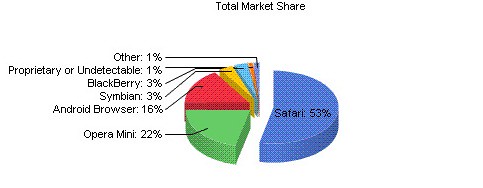Google views the smartphone market as nothing more than a numbers game. Getting Android handsets into as many hands as possible is their ultimate goal, and while they like to tout impressive numbers like 700,000 daily activations, the reality is that Android users are less likely to purchase apps than their iPhone counterparts and that developers still prefer iOS over Android by a significant margin. Indeed, the bulk of all mobile app profits fall on the iOS side of the equation.
What’s more, iPhone users seem to be more engaged with their device to the extent that they browse the web in much higher numbers than any other group of smartphone owners.
According to data compiled by Net Marketshare, Safari’s share of the mobile browser market is 53% – a figure made all the more impressive in light of Android’s overall marketshare dominance. In contrast, Google’s Android browser only has a 16% marketshare in the mobile browser space.

This of course begs the question – are iPhone users simply that much more into web browsing? Or, perhaps, is it possible that the total number of Android activations Google loves bragging about includes an inordinate number of low-feature Android devices that don’t necessarily lend themselves towards web browsing?
Either way, there’s more to the iPhone v. Android battle than pure marketshare. While that’s certainly important, it’s just one factor to account for when contemplating much more telling metrics such as which platform instills the most customer loyalty, or which platform provides a more lucrative investment for developers.





Fri, Jan 6, 2012
News